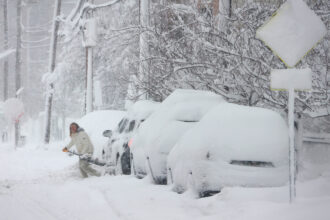Attorneys representing 21 children who are suing the federal government over its responsibility to slow climate change are seeking answers from the oil and gas industry. The plaintiffs want to uncover what role fossil fuel interests played in shaping government climate policies.
The plaintiffs in Juliana v. United States filed a request for documents from the American Petroleum Institute (API), the largest U.S. trade group for the oil and gas industry and an intervenor on behalf of the U.S. government in the case.
The request seeks a wide range of documents, including any from internal API groups related to climate change and government lobbying. Examples noted in the request include API’s CO2 and Climate Change Task Force, its Environmental Strategy Team and its Climate Change Steering Group. It also seeks communications with Exxon and other oil companies discussing climate.
The request specifically seeks memoranda written by individual industry researchers, lobbyists, trade association employees and other fossil fuel advocates. Those people were engaged in early research into climate change and in attempts by the industry to sow doubt about the emerging consensus that global warming is caused by emissions from fossil fuels.
Many of those named figured in an investigation by InsideClimate News in 2015, which included revelations that API’s CO2 and Climate Change Task Force monitored and shared climate research between 1979 and 1983. The investigation showed that scientists from nearly every major oil company, including Exxon, Texaco and Shell, were aware of the oil industry’s possible impact on the world’s climate far earlier than previously known.
Shell warned of the catastrophic risks of climate change more than a quarter of century ago in a 1991 film that was rediscovered and posted online by the Correspondent, a Dutch news outlet, on Feb. 28.
Ties between industry and government strengthened during the early years of the George W. Bush administration when fossil fuel advocates like former API lobbyist Philip A. Cooney gained influence over U.S. government policy regarding climate change.
Cooney became chief of staff at the White House Council on Environmental Quality, an office that drove climate policy. Government scientists accused Cooney of rewriting federal research reports to sow doubt about man-made climate change. Cooney resigned in 2005 and went to work for Exxon.
In their lawsuit, which was originally filed in September 2015 and updated to include President Trump as a defendant after his inauguration, the plaintiffs accuse the federal government of violating their constitutional rights by knowing about the dangerous climate impacts of burning fossil fuels while supporting their development.
The federal government under the Obama administration, along with fossil fuel companies, requested dismissal of the case, but a federal district court judge in Oregon ruled last fall that the case could proceed.
The litigation, under something called the public trust doctrine, is an unusual approach to fighting climate change by holding the government accountable, but it could uncover key documents in the role industry played in shaping U.S. policies related to the issue. (The other causes of action in the complaint are substantive due process under the 5th amendment and equal protection.)
“The truth will come out in this case,” Julia Olson, counsel for plaintiffs and executive director of Our Children’s Trust said in a statement. “We intend to hold the defendants accountable for their longstanding role in causing climate change, and their clear knowledge about the price the planet would pay for the sake of their profits.”
About This Story
Perhaps you noticed: This story, like all the news we publish, is free to read. That’s because Inside Climate News is a 501c3 nonprofit organization. We do not charge a subscription fee, lock our news behind a paywall, or clutter our website with ads. We make our news on climate and the environment freely available to you and anyone who wants it.
That’s not all. We also share our news for free with scores of other media organizations around the country. Many of them can’t afford to do environmental journalism of their own. We’ve built bureaus from coast to coast to report local stories, collaborate with local newsrooms and co-publish articles so that this vital work is shared as widely as possible.
Two of us launched ICN in 2007. Six years later we earned a Pulitzer Prize for National Reporting, and now we run the oldest and largest dedicated climate newsroom in the nation. We tell the story in all its complexity. We hold polluters accountable. We expose environmental injustice. We debunk misinformation. We scrutinize solutions and inspire action.
Donations from readers like you fund every aspect of what we do. If you don’t already, will you support our ongoing work, our reporting on the biggest crisis facing our planet, and help us reach even more readers in more places?
Please take a moment to make a tax-deductible donation. Every one of them makes a difference.
Thank you,













